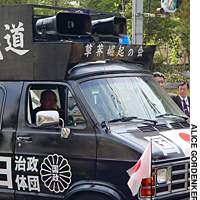Dear Alice,
Once again, loudspeaker trucks marred what should have been a peaceful weekend at home. First it was a parade of vehicles blasting nationalist songs, then it was that pesky guy who circles round and round calling out for used appliances. Even the roasted sweet-potato vendor, whom I used to think was quaint, is getting on my nerves with his over-amplified sales song. What the heck are the laws on this? It amazes me that this kind of noise pollution is tolerated in a country where everyone goes out of their way to avoid causing meiwaku (trouble to others).
Brett W., Tokyo, Nishi-Azabu
You have my sympathy and a complimentary pair of my favorite brand of earplugs, which should be arriving in your mailbox soon. There are laws in Japan on noise pollution, but they vary depending on who is making the noise and where you live, and they are, in all cases, difficult to enforce. I'm afraid you have a better chance of finding relief through earplugs than through legal channels.
Because of the address on the bottom of your e-mail, I understand why you're writing. You live near the Chinese Embassy, a favorite target of the uyokusha (rightwing trucks), those soapboxes-on- wheels used by nationalist groups as they exercise their right to free speech. The vehicles are also referred to as gaisensha, an abbreviation taken from what they're doing when they're out and about: gaito senden katsudo (street-corner promotion activities).
When one of the rightwing groups wants to roll out a sound truck, they are required by law to present the police with a todoke (written notice) detailing the time they'll be out and the route they'll take. Their broadcasts aren't supposed to be any louder than 85 decibels, and the police can and will stop trucks exceeding the noise limit. But enforcement efforts usually turn into a game of cat- and-mouse, with the trucks turning down the loudspeakers when the police show up and cranking the volume back up when they're gone.
Sound trucks for commercial purposes are not subject to that kind of police scrutiny and do not require special permits. I don't mind the sweet-potato and laundry-pole vendors, but I have a particular distaste for the haihin kaishu gyosha (junk collectors). This is mostly because of the guy who parks in front of my apartment on Saturday mornings and solicits, again and again via an amplified tape loop, all my unneeded computers, televisions and stereo components.
Local governments set the rules on noise. I checked with your ward office and your neighborhood is zoned Class II, Designated Mid- and High-Rise Residential, which means emitted noise shouldn't exceed 45 decibels except between 8 a.m. and 5 p.m., when the limit rises to 50 decibels. I can't explain why the rightwing trucks are apparently allowed to broadcast up to 85 decibels in a neighborhood zoned to 50 decibels, and neither could your ward office.
Unfortunately, the noise-pollution rules don't provide penalties for violations, which means that if someone is making more than the allowable level of noise, all the ward office can do is ask them to stop. Even the police can't do more than issue a warning.
This lack of enforcement authority led to an amazing case last year that made headlines around the world. Miyoko Kawahara, a 58-year-old woman in Nara Prefecture, was arrested after harassing a neighbor with noise for over two years. She blasted music nearly 24 hours a day from a portable player she pointed at her neighbor's home, and shouted constant insults out the window. The police couldn't do anything except ask her to stop, which she didn't. Finally, after the neighbor made a medical case that the music was causing insomnia and headaches, the police moved in and arrested Kawahara -- not for noise pollution, because that wasn't possible -- but on suspicion of causing physical injury.
I asked the police and your ward office what you should do when sounds trucks are making noise that seems beyond legal levels. Both sources encouraged you to call 110, the emergency police number. I was surprised, having thought 110 should only be used for more serious matters, but they said noise pollution complaints are taken seriously and the police will send a car to investigate. My own suggestion would be to time your vacations for election periods and days when rightwingers come out in numbers, which include Feb. 7 -- Hoppo Ryodo no Hi, the designated day for protests against Russia's claim to four islands off the northern coast of Japan, and Aug. 9 -- Hanro Day, another big day for anti-Russia broadcasts.
And please do try those earplugs.

















With your current subscription plan you can comment on stories. However, before writing your first comment, please create a display name in the Profile section of your subscriber account page.